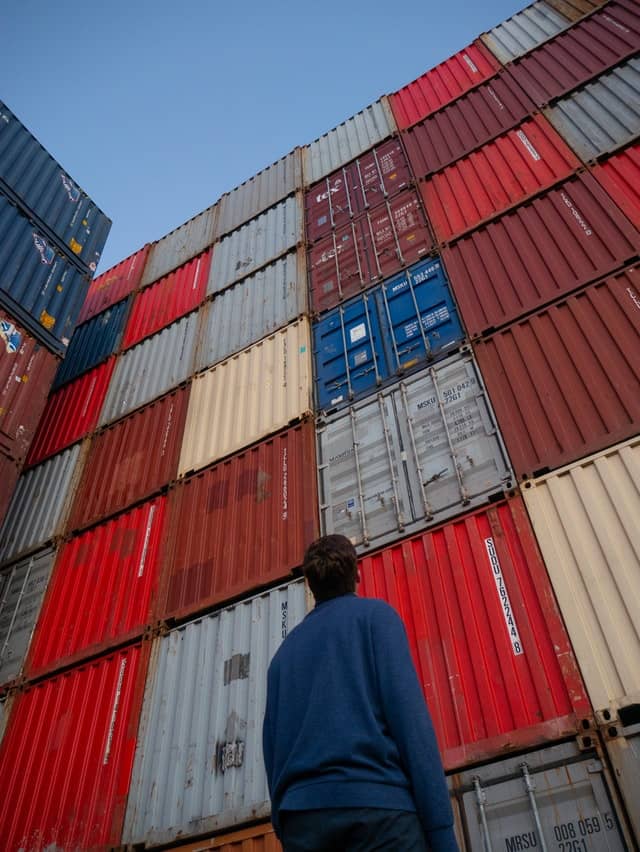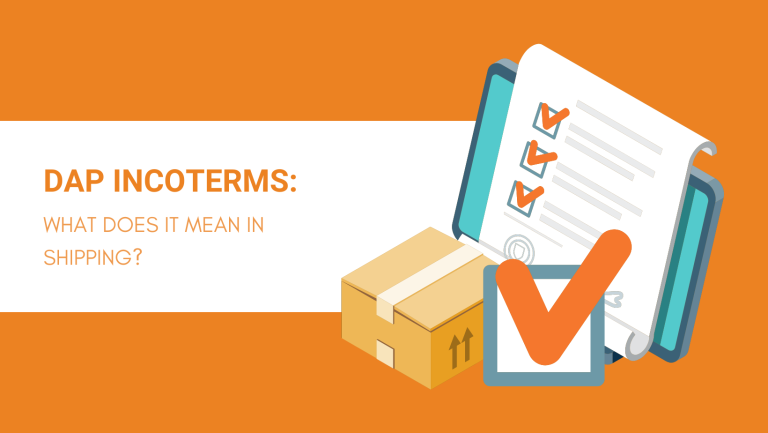Shipping terminologies might sometimes be confusing. It especially happens when you are new to the import and export business. A good understanding of these terminologies ensures that you enjoy smooth business transactions with your sellers.
DAP Incoterms is one of the widely used phrases in the import and export business. This article throws light upon what it is, its process, importance, pros, cons, and much more.
At the end of this article, you will be in a better position to decide why and when to go for the DAP Incoterms agreement with your seller while you are importing goods from other countries.
Let’s start.
What Is DAP Incoterms?
DAP stands for “Delivered At Place”. So, the DAP Incoterms refers to an agreement between the buyer and seller in which the seller takes responsibility for the buyer’s products until they reach an agreed place that the buyer specifies.
It is one of the clear and predefined terms in which the seller agrees to deliver the products of the buyer at the place decided by the buyer.
In most cases, the place where the delivery or the shipment arrives is the seaport that is nearest to the buyer’s warehouse.
Fast Fact: Incoterms are referred to as the clear terms and conditions of the international trade contracts between the buyers and sellers. These trade rules are introduced by the International Chamber of Commerce.
Salient Features of DAP Incoterms Agreement

Following are the salient features of DAP Incoterms.
- It is a shipping agreement between the buyer and the seller.
- The buyer specifies the final destination of the shipment. For example, it can be a port in the desired city where the buyer would like his shipment to be delivered. So, the agreement may be called “DAP, Port of Houston”
- The seller is responsible for arranging the transportation of goods including the transport costs from the origin to the place specified by the buyer.
- The seller will not be held responsible after the shipment has been safely delivered to the agreed place.
- The seller will only deliver the shipment to the place and will not be responsible to unload the products at that place.
- It will be the buyer’s responsibility to get the shipment unloaded from that place.
- The buyer will have to take care of the shipment after it is delivered to the desired place.
- After the shipment has been delivered to the agreed place, any extra pieces of work or the extra charges will be taken care of by the buyer.
Importance of DAP Incoterms
As an importer or an international buyer, it is very much important for you to know all the relevant Incoterms. For example, if you import goods from China to your country, you will need to know about the Incoterms related to your deal with the seller in China.
Sometimes, the international contracts of buying and selling are too complicated to understand. The buyers sign the contracts without understanding the clear responsibilities of the seller.

They tend to take some transportation obligations for granted.
That is where the Incoterms help you. In this case, it clearly states what will be included in the DAP contract. It also awards clear responsibilities to the buyers and sellers which they cannot deny at a later stage of the import and export process.
So, in a nutshell, the importance of DAP Incoterms is to bring the buyers and sellers on the same page and make them stick there.
Now, we have established the importance of DAP Incoterms, let’s move on to its pros and cons.
Pros of DAP Incoterms
Following are the Pros of DAP Incoterms.
Helps in Cost Calculations
The DAP incoterms help you establish how much you are going to pay for each of the processes.

There are many costs involved in getting the products to your desired location. If you understand the DAP incoterms, you will be in a better position to calculate the overall cost and efforts required to get hold of the imported products.
Suppose, you have signed the contract with the seller in terms of DAP and you are not much familiar with the customs duties, you may have to face some unusual charges that may have a huge impact on your overall import cost.
The Value Added Tax is one of the most common customs taxes that are applied in most countries. On average, it is somewhere around 15% to 30% of the total import value.
Other expenses or charges that the buyer needs to incorporate include the unloading charges at the agreed place of delivery and the shipping insurance if the buyer prefers to insure his goods during the transportation.
If you have chosen the DAP incoterms, you have to be aware of all the import duties and taxes of the destination country.

You have to include these charges to calculate the overall cost of importing that shipment.
Helps Determine Your Product’s Selling Price
You know all the charges or costs that you have to spend in importing the products at your destination. This will help you set the final price of your products for selling.
You might have made mistakes if you would not have known about all the costs while setting the price of your products in your local market.
The Seller Is Responsible for Major Portion
The DAP Incoterms clearly defines the seller’s responsibilities. The seller pays for and is responsible for over 80% of the import risks and costs.
Starting from the packaging of the products to fulfilling the export obligations of the origin country and to delivering the goods to the agreed place, the seller has to take all the pain and bear all the costs.
He will also be held responsible for any kind of damages to the products until they are delivered to the desired place.
So, you don’t have to worry about your products for the majority of the import process.
Beneficial for Repeat Orders
DAP Incoterms is especially beneficial for experienced buyers. If you have repeat orders of a product or number of products, you must have been importing products on a regular basis.
This means that you are also familiar with all the import rules, customs duties, taxes, and other formalities.

Such experienced importers can take benefit from this agreement instead of relying on the seller.
The experienced buyers can save on the unloading and customs duties expenses that would otherwise have been charged by the seller in any other type of Incoterm.
Beneficial for Nearby Warehouse
If a buyer has a warehouse that is near the agreed place of delivery, then it is beneficial for the buyer to go for DAP Incoterms. That is because he can save on the cost of transporting goods to the warehouse.
Cons of DAP Incoterms
Following are some of the cons or disadvantages of the DAP Incoterms.
Unloading Arrangements
The seller will not be responsible to make any arrangements for the unloading of the items.

So, any delay in unloading or any kind of damages during or after the unloading of items will be the buyer’s responsibility.
Post-Delivery Hassle
If you want to take the products to any other location which can be your business warehouse or anywhere else, you have to do it on your own. It can be a hassle for the newcomers. You may want to hire local freight companies to do so. This will incur more costs.
Customs Duties
As a buyer, you have to arrange and will be responsible for all the import duties, taxes, and abide by all the local customs, laws, and regulations. The seller will not assist you in these spheres.
It is not like the seller cannot help you regarding the custom duties, etc. It is just that the seller has not signed for these tasks. If you want the seller to take care of the customs duties, you may have to go for the DDP (Delivered Duty Paid).
Risk of Losing Pre-Delivery Arrangements
In most cases, the custom formal procedures are cleared well before the shipment arrives. Importers or buyers do it in advance to save time and avoid any demurrage charges.
If in case, the seller fails to deliver the products at the desired place or the items are damaged at the delivery, your pre-delivery arrangements and the payments will bear no fruits. Rather, you may lose the money you had paid for the customs arrangements.
Disputes in DAP Incoterms
Even though the terms and conditions are clearly signed and agreed upon between the seller and the buyer, some disputes may still arise.
One such example can be the additional costs or the “demurrage” charged by the port authorities where the shipment arrives.
The demurrage may be charged by the port or custom authorities due to any deficiency in the process, or documentation, etc. So, the buyer and the seller try to hold each other responsible for the extra charges.
The best, in this case, is to foresee all of the requirements in advance.
But as the documentation and the custom processes may vary from one country to another, there may still be disputes.
In such cases, the party that does not comply with the written agreement is held responsible for the payment of extra charges or a fine.
Fast Fact: The dispute may be severe if the charges are too high for any party to bear or the agreement is unclear. So, it is always better to take a professional sourcing company on board.
DAP Shipping Responsibilities
Now, we discuss the duties, responsibilities, or shipping obligations in a typical DAP agreement.
Following are the clear responsibilities of a seller and buyer in a DAP agreement according to the international standards stipulated by the International Chamber of Commerce.

Seller’s Responsibilities in DAP Incoterms
- The seller will provide all the items that are asked by the buyer along with their invoice and other documents that provide the details of the products.
- Picking up the products from the source.
- He will be responsible for the packing of the products so that they are ready to be exported in a way that they are not damaged due to the poor packaging.
- Carrying the products and delivering them to the port for export.
- Carrying out all the export documentation and other formalities.
- Paying for any customs clearance fee for the export of goods.
- Loading of the products to be shipped out.
- Ensuring the inspection of products prior to the dispatch.
- Arranging and bearing the cost of the main shipping facility.
- Delivering the product to the agreed place as specified by the buyer.
- Take care of the handling charges at the specified place just before the product is ready to be unloaded.
Buyer’s Responsibilities in DAP Incoterms
- The buyer will be responsible for the following tasks in the DAP Incoterms.
- To unload the goods from the container including the unloading costs and arrangements.
- Take care of the import duties and meet all other import and customs formalities.
- Bearing the cost of shipment inspection in the destination country.
- Transportation of the products from the port to any other place where the buyer desires.
As you can see, the majority of the work has been the responsibility of the seller in DAP Incoterms. However, the buyer also has a vital role in completing this import process.
FAQs about DAP Incoterms
Following are the frequently asked questions regarding the DAP Incoterms. Read the answers for more clarity on the topic.
What Mode of Transport Can Be Used with DAP Incoterms?
DAP Incoterms are not limited to a single mode of transportation. It can be equally applied to any kind of transportation method used.
It includes the transportation or shipment via sea, road, rail, and air.
Who Should Use DAP Incoterms?
An experienced buyer. The sellers are open to doing business with new or old buyers. As a buyer, you need to decide whether you can handle the unloading and import formalities, etc. If yes, you can go for the DAP Incoterms.
Otherwise, you can adopt other options as per your level of convenience.
What Are DAP vs DDP Incoterms?
As a buyer, you must have noticed one of the biggest potential issues in the DAP is to be responsible for import duties and customs clearance of the shipment.
DDP Incoterms solves that issue too. DDP Incoterms means “Delivered Duty Paid”. It makes the customs duty and import formalities to be the responsibility of the seller. So, the risk transfers more towards the seller in DDP.
All the other seller obligations in DDP remain the same as in the DAP. It puts the additional responsibility on the seller to clear the shipment from the customs in the destination country.
However, the unloading of the products still remains the responsibility of the buyer.
What Are DAP vs DPU Incoterms?
DPU means “Delivered at Place Unloaded”. All of the processes and seller’s obligations remain the same in DPU as they were in the DAP except for the fact the seller will also be responsible for unloading the products at the place of destination.
The DPU Incoterms was previously knowns as DAT (Delivered at Terminal).
This is to be noted that the DPU Incoterms does not put the import and customs formalities on the seller. The customs duties, taxes, and import clearance would remain the responsibility of the buyer in DPU.
Takeaway
DAP Incoterms is an important part and parcel of the international supply chain process. It makes the international trade business more clear and fair by defining the responsibilities of buyers and sellers.
As a new buyer, an ideal contract would be to make the seller do the most on both seller’s and buyer’s premises. You can go for the DAP deal if it makes you more comfortable in dealing with unloading and the customs, etc.
We have tried our best to explain the DAP to you in the simplest possible way. Do you want to source and ship profitable products from China? Ask for a free quote today.

